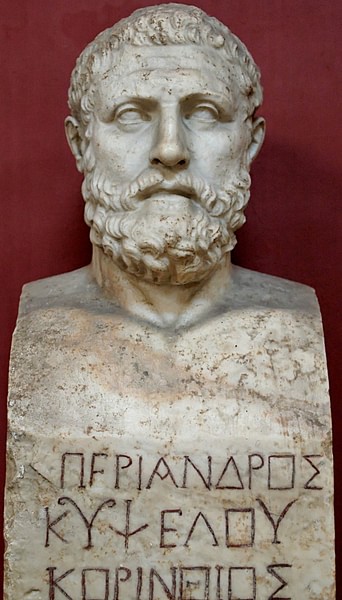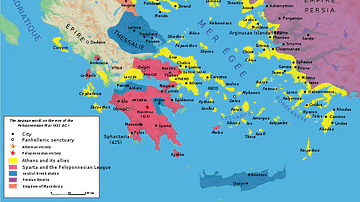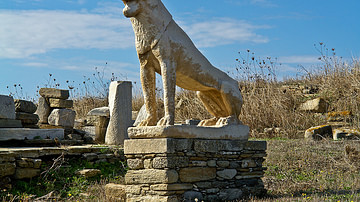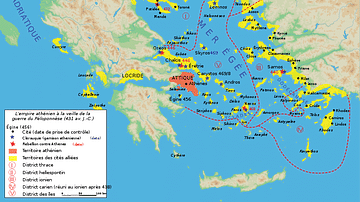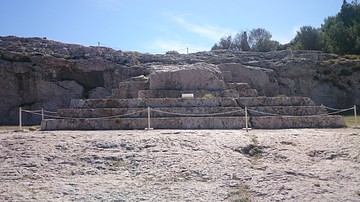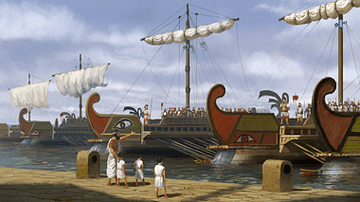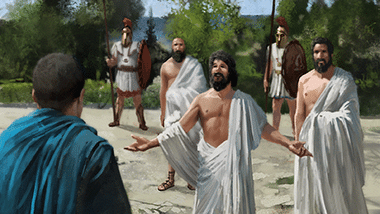
Ancient Greece witnessed a wide variety of government systems as people searched for the answers to such fundamental questions as who should rule and how? Should sovereignty lie in the rule of law, the constitution, officials, or the citizens? Not settling on a definitive answer, governments in the Greek world took extraordinarily diverse forms, from tyranny to democracy.
Across different Greek city-states and over many centuries, political power expressed itself in different forms of government, often in the same city as it evolved. Power could rest in the hands of a single individual, an elite or in every male citizen: democracy - widely regarded as the Greeks' greatest contribution to civilization.
The four most common systems of Greek government were:
- Democracy - rule by the people (male citizens).
- Monarchy - rule by an individual who had inherited his role.
- Oligarchy - rule by a select group of individuals.
- Tyranny - rule by an individual who had seized power by unconstitutional means.
Our knowledge of the political systems in the ancient Greek world comes from a wide range of sources. Whilst for Athens, it is possible to piece together a more complete history, we have only an incomplete picture of the systems in most city-states and many details of how the political apparatus actually functioned are missing. Surviving, though, are over 150 political speeches and 20,000 inscriptions which include 500 decrees and 10 laws. There are also two specifically political texts with the same title, The Constitution of the Athenians, one written by Aristotle or one of his pupils and the other attributed (by some) to Xenophon. Other sources which discuss politics and government include Aristotle's Politics and the historical works of Herodotus, Thucydides, and Xenophon. In addition, politics is often lampooned in the comedies of Aristophanes.
Democracy
Athens' constitution is called a democracy because it respects the interests not of the minority but of the whole people. When it is a question of settling private disputes, everyone is equal before the law; when it is a question of putting one person before another in positions of public responsibility, what counts is not membership of a particular class, but the actual ability which the man possesses. (Pericles, 431 BCE)
The word democracy derives from the Greek dēmos which referred to the entire citizen body and although it is Athens which has become associated with the birth of democracy (demokratia) from around 460 BCE, other Greek states did establish a similar political system, notably, Argos, (briefly) Syracuse, Rhodes, and Erythrai. Athens is, however, the state we know most about. The assembly of Athens met at least once a month, perhaps two or three times, on the Pnyx hill in a dedicated space which could accommodate 6000 citizens. Any male citizen 18 years or over could speak (at least in theory) and vote in the assembly, usually with a simple show of hands. Attendance was even paid for in certain periods which was a measure to encourage citizens who lived far away and couldn't afford the time-off to attend.
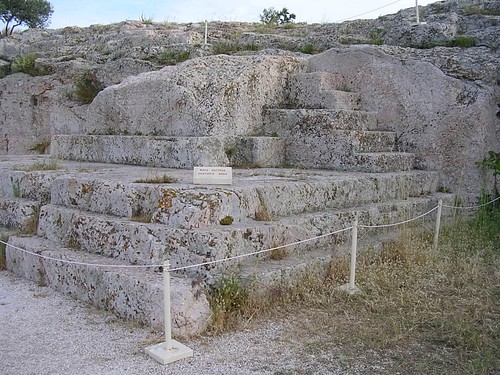
Citizens probably accounted for 10-20% of the polis population, and of these it has been estimated that only 3,000 or so people actively participated in politics. Of this group, perhaps as few as 100 citizens - the wealthiest, most influential, and the best speakers - dominated the political arena both in front of the assembly and behind the scenes in private conspiratorial political meetings (xynomosiai) and groups (hetaireiai). Critics of democracy, such as Thucydides and Aristophanes, also pointed out that the dēmos could be too easily swayed by a good orator or popular leaders (the demagogues) and get carried away with their emotions. Perhaps the most famous bad decision from the Athenian democracy was the death sentence given to the philosopher Socrates in 399 BCE.
Issues discussed in the assembly ranged from deciding magistracies to organising and maintaining food supplies to debating military matters. There was in Athens (and also Elis, Tegea, and Thasos) a smaller body, the boulē, which decided or prioritised the topics which were discussed in the assembly. In addition, in times of crisis and war, this body could also take decisions without the assembly meeting. The boulē or council of 500 citizens was chosen by lot and had a limited term of office, which acted as a kind of executive committee of the assembly. The decrees of the Assembly could also be challenged by the law courts. Similar in function to the boulē was the council of elders (selected men over 60), the gerousia, of Sparta, which also had the two Spartan kings as members and had certain legal powers. Similar bodies of elders existed in Corinth and Stymphalos. In Athens, the Areopagus was a similar such council, where elders were made members for life.
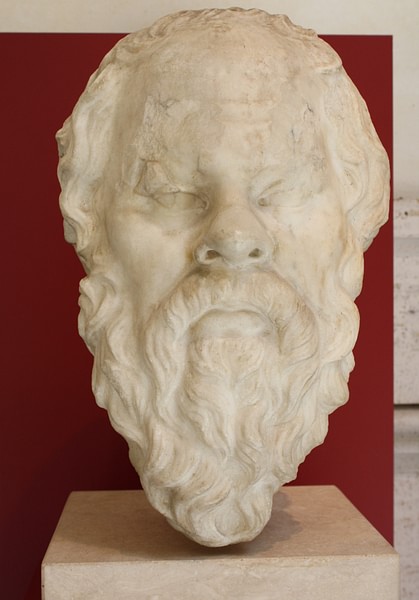
In other Greek states then, there were also democratic assemblies, sometimes, though, with a minimum property stipulation for attendees (as in the Boiotian federation 447-386 BCE). Some city-states also mixed democratic assemblies with a monarchy (for example, Macedonia and Molossia).
Monarchy
In the Greek world monarchies were rare and were often only distinguishable from a tyranny when the hereditary ruler was more benevolent and ruled in the genuine interest of his people. The most famous monarchies were those in the states of Macedonia and Epeiros, where the ruler shared power with an assembly, limited though these were in practice. Although Sparta also possessed a citizen assembly, it is most famous for its system of two kings. Not absolute monarchs, they did, however, hold great power when they led the Spartan army in times of war. During peacetime the kings were kept in check by ephors (ephoroi) who were themselves elected by the assembly. Clearly, a degree of political consensus was necessary for this overlapping apparatus to function. The kings were also members of the gerousia and were admitted from a young age, so that they must have had a significant advantage over the other members who couldn't join until they were 60. Spartan kings could, however, be put on trial and even exiled.
Tyranny
Tyrants were sole rulers of a state who had taken power in an unconstitutional manner, often murdering their predecessor. However, Greek tyrants were not necessarily evil rulers (as the word signifies today); they simply looked after their own interests. Syracuse in Sicily had a run of famous tyrants, for example, Dionysios from 405 BCE and his son Dionysios II, who took over in 367 BCE. Others include Peisistratos in Athens (from c. 560 BCE) - a typical benevolent tyrant who actually paved the way for democracy, Pheidon in Argos (c. 660 BCE), Lycophron in Thessaly, the Kypselidai, which included Periander, in Corinth (c. 657-585 BCE), and Polycrates in Samos (530-522 BCE). For Athenians, tyranny became the exact opposite of democracy, a position that allowed the citizens of Athens to feel a certain superiority. This feeling was especially evidenced in the demonizing of the Persian kings Darius and Xerxes, the tyrants par excellence.
Oligarchy
An oligarchy is a system of political power controlled by a select group of individuals, sometimes small in number but it could also include large groups. For the Greeks (or more particularly the Athenians) any system which excluded power from the whole citizen-body and was not a tyranny or monarchy was described as an oligarchy. Oligarchies were perhaps the most common form of city-state government and they often occurred when democracy went wrong. Unfortunately, information concerning oligarchies in the Greek world is sparse. We know that in 411 BCE in Athens, 'the oligarchy of the 400' took power out of the hands of the Assembly and were themselves superseded by a more moderate oligarchy of 5000. In 404 BCE, following the defeat of the Athenian military forces in Sicily, there was an oligarchy of 'the Thirty Tyrants' in Athens which was a particularly brutal regime, noted for its summary executions. Megara and Thebes were other states which had an oligarchic system.
Public Officials
In Athens the law was devised and enforced by magistrates (archai). All citizens were eligible for the position, and indeed there may well have been a certain expectation that the honourable citizen would play his active part in civic life. For the Greeks, the state was not seen as an interfering entity which sought to limit one's freedom but as an apparatus through which the individual could fully express his membership of the community. The regular turnover of archai, due to limited terms of office and the prohibition of re-election, meant abuse of power was kept in check and the rulers would, in turn, become the ruled. Various boards of officials also existed to make administrative decisions; members of these were usually taken from each of the ten traditional tribes. Many civic positions were short-term and chosen by lot to ensure bribery was kept to a minimum. Importantly, positions of power often required not only free time but also financial layout to fund municipal projects such as shipbuilding and festivals. Therefore, it was probably the case that public positions were in reality dominated by the wealthier citizens.
In Sparta, the most important state officials were the five ephors. These were probably elected by the assembly of Sparta and they held office for only one year. However, during that time they had power over most areas of civic life and they could appoint and check on all the other public officials.
Military commanders also held public office in some city-states. In Athens, the board of ten elected generals, known as the strategoi, could influence the agenda of the assembly and so prioritise their own causes. They were subject to votes of confidence by the Assembly but this didn't stop Pericles, for example, holding office as strategos for 15 consecutive years.
